The Impact of Health Education on Total Knee Replacement Patients
VerifiedAdded on 2020/02/19
|12
|3896
|49
Essay
AI Summary
This essay focuses on the critical role of health education for patients undergoing total knee replacement (TKR). It highlights the benefits of pre-operative education in improving patient knowledge, health behaviors, and outcomes. The essay explores how education can manage patient expectations, reduce anxiety, and improve post-operative recovery. It emphasizes the importance of social support and health literacy in achieving positive results. The discussion covers the content of pre-operative education, including surgical procedures, post-operative care, and potential complications. It also addresses the impact of education on reducing hospital stays and readmissions. The essay underscores the need for clear and accessible educational materials to enhance patient understanding and compliance. The study emphasizes the role of nurses and healthcare professionals in delivering effective education, promoting patient empowerment, and fostering a sense of responsibility for successful outcomes. The assignment also covers the patient's social circle and how they can support and encourage the patient. Overall, the essay provides a comprehensive overview of how health education can significantly enhance the TKR experience and improve patient satisfaction and well-being.
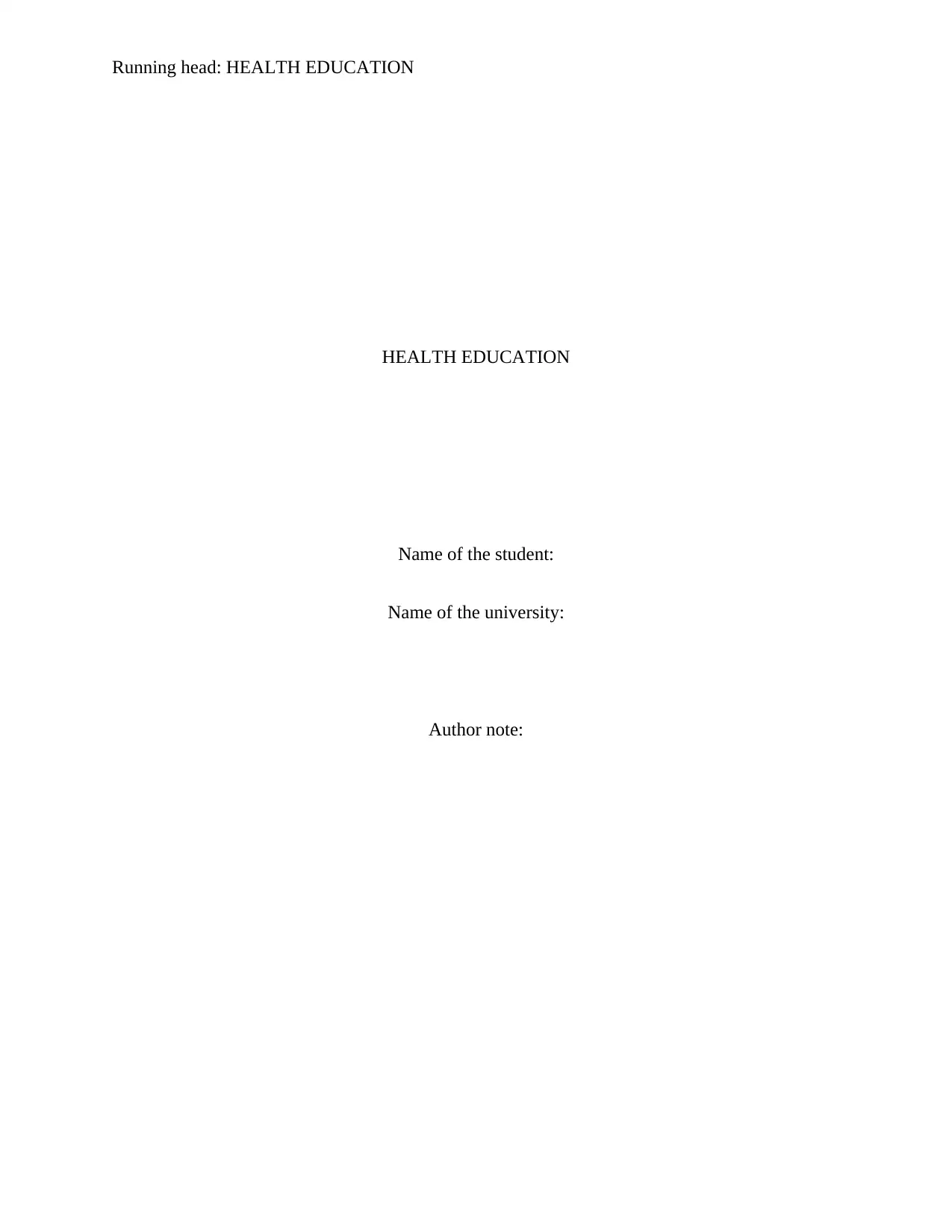
Running head: HEALTH EDUCATION
HEALTH EDUCATION
Name of the student:
Name of the university:
Author note:
HEALTH EDUCATION
Name of the student:
Name of the university:
Author note:
Paraphrase This Document
Need a fresh take? Get an instant paraphrase of this document with our AI Paraphraser
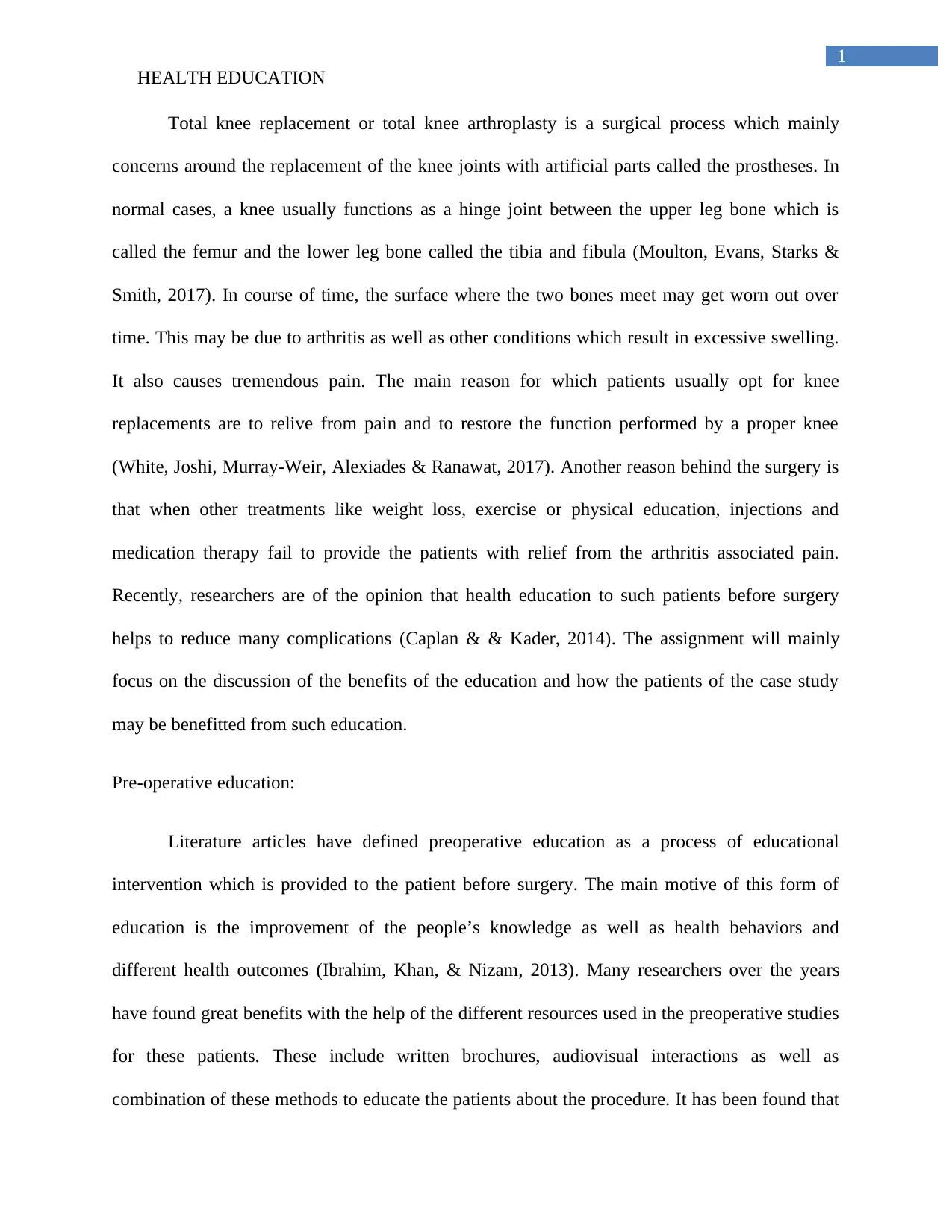
1
HEALTH EDUCATION
Total knee replacement or total knee arthroplasty is a surgical process which mainly
concerns around the replacement of the knee joints with artificial parts called the prostheses. In
normal cases, a knee usually functions as a hinge joint between the upper leg bone which is
called the femur and the lower leg bone called the tibia and fibula (Moulton, Evans, Starks &
Smith, 2017). In course of time, the surface where the two bones meet may get worn out over
time. This may be due to arthritis as well as other conditions which result in excessive swelling.
It also causes tremendous pain. The main reason for which patients usually opt for knee
replacements are to relive from pain and to restore the function performed by a proper knee
(White, Joshi, Murray-Weir, Alexiades & Ranawat, 2017). Another reason behind the surgery is
that when other treatments like weight loss, exercise or physical education, injections and
medication therapy fail to provide the patients with relief from the arthritis associated pain.
Recently, researchers are of the opinion that health education to such patients before surgery
helps to reduce many complications (Caplan & & Kader, 2014). The assignment will mainly
focus on the discussion of the benefits of the education and how the patients of the case study
may be benefitted from such education.
Pre-operative education:
Literature articles have defined preoperative education as a process of educational
intervention which is provided to the patient before surgery. The main motive of this form of
education is the improvement of the people’s knowledge as well as health behaviors and
different health outcomes (Ibrahim, Khan, & Nizam, 2013). Many researchers over the years
have found great benefits with the help of the different resources used in the preoperative studies
for these patients. These include written brochures, audiovisual interactions as well as
combination of these methods to educate the patients about the procedure. It has been found that
HEALTH EDUCATION
Total knee replacement or total knee arthroplasty is a surgical process which mainly
concerns around the replacement of the knee joints with artificial parts called the prostheses. In
normal cases, a knee usually functions as a hinge joint between the upper leg bone which is
called the femur and the lower leg bone called the tibia and fibula (Moulton, Evans, Starks &
Smith, 2017). In course of time, the surface where the two bones meet may get worn out over
time. This may be due to arthritis as well as other conditions which result in excessive swelling.
It also causes tremendous pain. The main reason for which patients usually opt for knee
replacements are to relive from pain and to restore the function performed by a proper knee
(White, Joshi, Murray-Weir, Alexiades & Ranawat, 2017). Another reason behind the surgery is
that when other treatments like weight loss, exercise or physical education, injections and
medication therapy fail to provide the patients with relief from the arthritis associated pain.
Recently, researchers are of the opinion that health education to such patients before surgery
helps to reduce many complications (Caplan & & Kader, 2014). The assignment will mainly
focus on the discussion of the benefits of the education and how the patients of the case study
may be benefitted from such education.
Pre-operative education:
Literature articles have defined preoperative education as a process of educational
intervention which is provided to the patient before surgery. The main motive of this form of
education is the improvement of the people’s knowledge as well as health behaviors and
different health outcomes (Ibrahim, Khan, & Nizam, 2013). Many researchers over the years
have found great benefits with the help of the different resources used in the preoperative studies
for these patients. These include written brochures, audiovisual interactions as well as
combination of these methods to educate the patients about the procedure. It has been found that
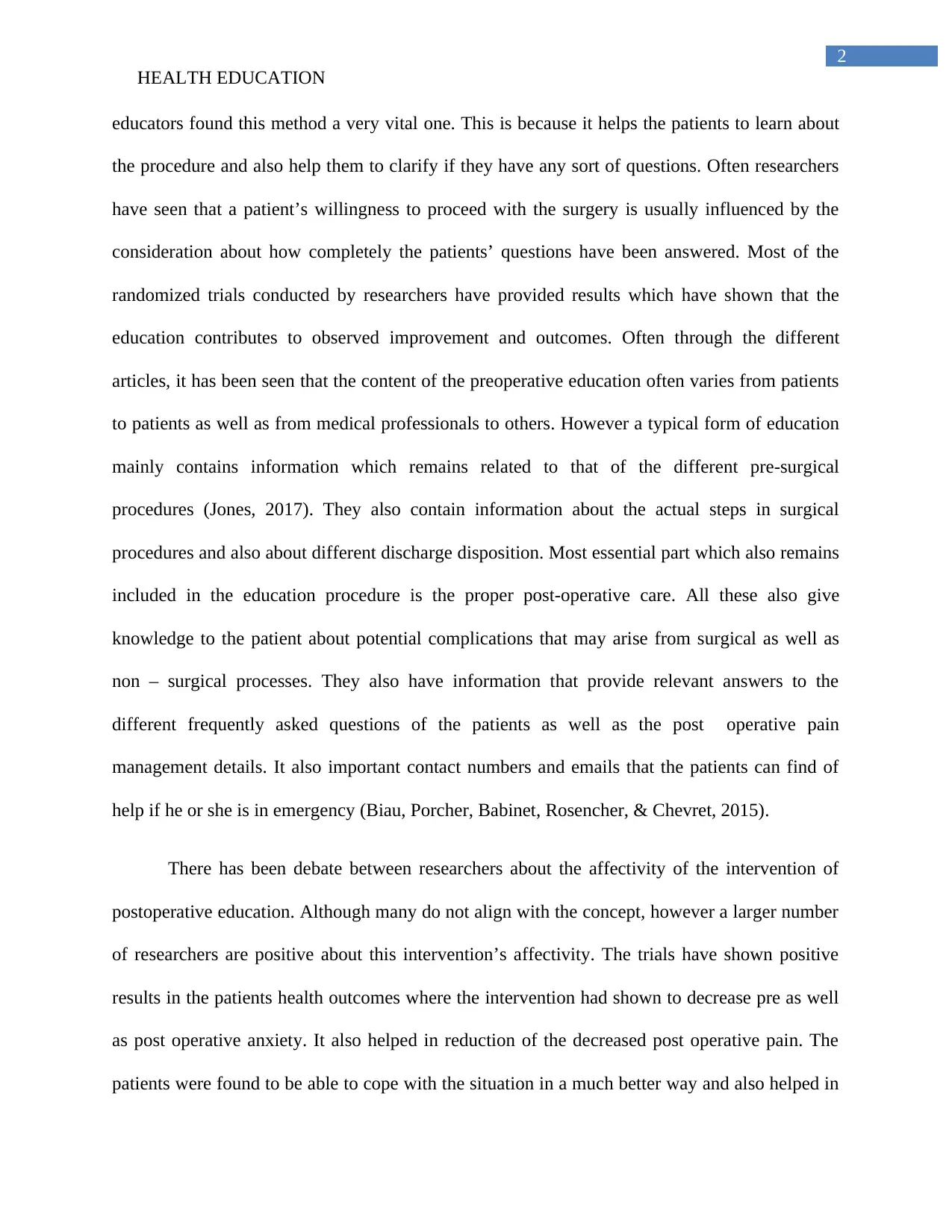
2
HEALTH EDUCATION
educators found this method a very vital one. This is because it helps the patients to learn about
the procedure and also help them to clarify if they have any sort of questions. Often researchers
have seen that a patient’s willingness to proceed with the surgery is usually influenced by the
consideration about how completely the patients’ questions have been answered. Most of the
randomized trials conducted by researchers have provided results which have shown that the
education contributes to observed improvement and outcomes. Often through the different
articles, it has been seen that the content of the preoperative education often varies from patients
to patients as well as from medical professionals to others. However a typical form of education
mainly contains information which remains related to that of the different pre-surgical
procedures (Jones, 2017). They also contain information about the actual steps in surgical
procedures and also about different discharge disposition. Most essential part which also remains
included in the education procedure is the proper post-operative care. All these also give
knowledge to the patient about potential complications that may arise from surgical as well as
non – surgical processes. They also have information that provide relevant answers to the
different frequently asked questions of the patients as well as the post operative pain
management details. It also important contact numbers and emails that the patients can find of
help if he or she is in emergency (Biau, Porcher, Babinet, Rosencher, & Chevret, 2015).
There has been debate between researchers about the affectivity of the intervention of
postoperative education. Although many do not align with the concept, however a larger number
of researchers are positive about this intervention’s affectivity. The trials have shown positive
results in the patients health outcomes where the intervention had shown to decrease pre as well
as post operative anxiety. It also helped in reduction of the decreased post operative pain. The
patients were found to be able to cope with the situation in a much better way and also helped in
HEALTH EDUCATION
educators found this method a very vital one. This is because it helps the patients to learn about
the procedure and also help them to clarify if they have any sort of questions. Often researchers
have seen that a patient’s willingness to proceed with the surgery is usually influenced by the
consideration about how completely the patients’ questions have been answered. Most of the
randomized trials conducted by researchers have provided results which have shown that the
education contributes to observed improvement and outcomes. Often through the different
articles, it has been seen that the content of the preoperative education often varies from patients
to patients as well as from medical professionals to others. However a typical form of education
mainly contains information which remains related to that of the different pre-surgical
procedures (Jones, 2017). They also contain information about the actual steps in surgical
procedures and also about different discharge disposition. Most essential part which also remains
included in the education procedure is the proper post-operative care. All these also give
knowledge to the patient about potential complications that may arise from surgical as well as
non – surgical processes. They also have information that provide relevant answers to the
different frequently asked questions of the patients as well as the post operative pain
management details. It also important contact numbers and emails that the patients can find of
help if he or she is in emergency (Biau, Porcher, Babinet, Rosencher, & Chevret, 2015).
There has been debate between researchers about the affectivity of the intervention of
postoperative education. Although many do not align with the concept, however a larger number
of researchers are positive about this intervention’s affectivity. The trials have shown positive
results in the patients health outcomes where the intervention had shown to decrease pre as well
as post operative anxiety. It also helped in reduction of the decreased post operative pain. The
patients were found to be able to cope with the situation in a much better way and also helped in
⊘ This is a preview!⊘
Do you want full access?
Subscribe today to unlock all pages.

Trusted by 1+ million students worldwide
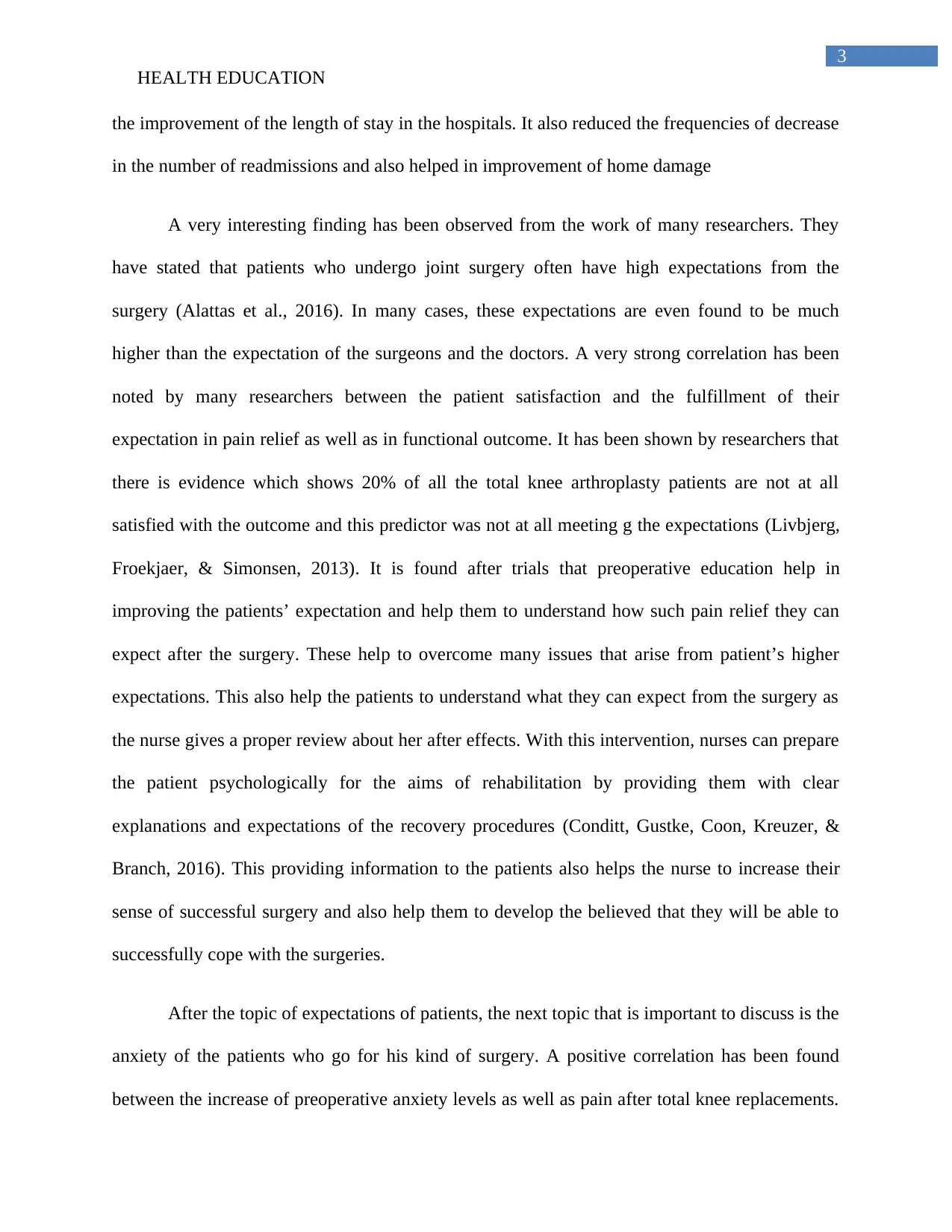
3
HEALTH EDUCATION
the improvement of the length of stay in the hospitals. It also reduced the frequencies of decrease
in the number of readmissions and also helped in improvement of home damage
A very interesting finding has been observed from the work of many researchers. They
have stated that patients who undergo joint surgery often have high expectations from the
surgery (Alattas et al., 2016). In many cases, these expectations are even found to be much
higher than the expectation of the surgeons and the doctors. A very strong correlation has been
noted by many researchers between the patient satisfaction and the fulfillment of their
expectation in pain relief as well as in functional outcome. It has been shown by researchers that
there is evidence which shows 20% of all the total knee arthroplasty patients are not at all
satisfied with the outcome and this predictor was not at all meeting g the expectations (Livbjerg,
Froekjaer, & Simonsen, 2013). It is found after trials that preoperative education help in
improving the patients’ expectation and help them to understand how such pain relief they can
expect after the surgery. These help to overcome many issues that arise from patient’s higher
expectations. This also help the patients to understand what they can expect from the surgery as
the nurse gives a proper review about her after effects. With this intervention, nurses can prepare
the patient psychologically for the aims of rehabilitation by providing them with clear
explanations and expectations of the recovery procedures (Conditt, Gustke, Coon, Kreuzer, &
Branch, 2016). This providing information to the patients also helps the nurse to increase their
sense of successful surgery and also help them to develop the believed that they will be able to
successfully cope with the surgeries.
After the topic of expectations of patients, the next topic that is important to discuss is the
anxiety of the patients who go for his kind of surgery. A positive correlation has been found
between the increase of preoperative anxiety levels as well as pain after total knee replacements.
HEALTH EDUCATION
the improvement of the length of stay in the hospitals. It also reduced the frequencies of decrease
in the number of readmissions and also helped in improvement of home damage
A very interesting finding has been observed from the work of many researchers. They
have stated that patients who undergo joint surgery often have high expectations from the
surgery (Alattas et al., 2016). In many cases, these expectations are even found to be much
higher than the expectation of the surgeons and the doctors. A very strong correlation has been
noted by many researchers between the patient satisfaction and the fulfillment of their
expectation in pain relief as well as in functional outcome. It has been shown by researchers that
there is evidence which shows 20% of all the total knee arthroplasty patients are not at all
satisfied with the outcome and this predictor was not at all meeting g the expectations (Livbjerg,
Froekjaer, & Simonsen, 2013). It is found after trials that preoperative education help in
improving the patients’ expectation and help them to understand how such pain relief they can
expect after the surgery. These help to overcome many issues that arise from patient’s higher
expectations. This also help the patients to understand what they can expect from the surgery as
the nurse gives a proper review about her after effects. With this intervention, nurses can prepare
the patient psychologically for the aims of rehabilitation by providing them with clear
explanations and expectations of the recovery procedures (Conditt, Gustke, Coon, Kreuzer, &
Branch, 2016). This providing information to the patients also helps the nurse to increase their
sense of successful surgery and also help them to develop the believed that they will be able to
successfully cope with the surgeries.
After the topic of expectations of patients, the next topic that is important to discuss is the
anxiety of the patients who go for his kind of surgery. A positive correlation has been found
between the increase of preoperative anxiety levels as well as pain after total knee replacements.
Paraphrase This Document
Need a fresh take? Get an instant paraphrase of this document with our AI Paraphraser
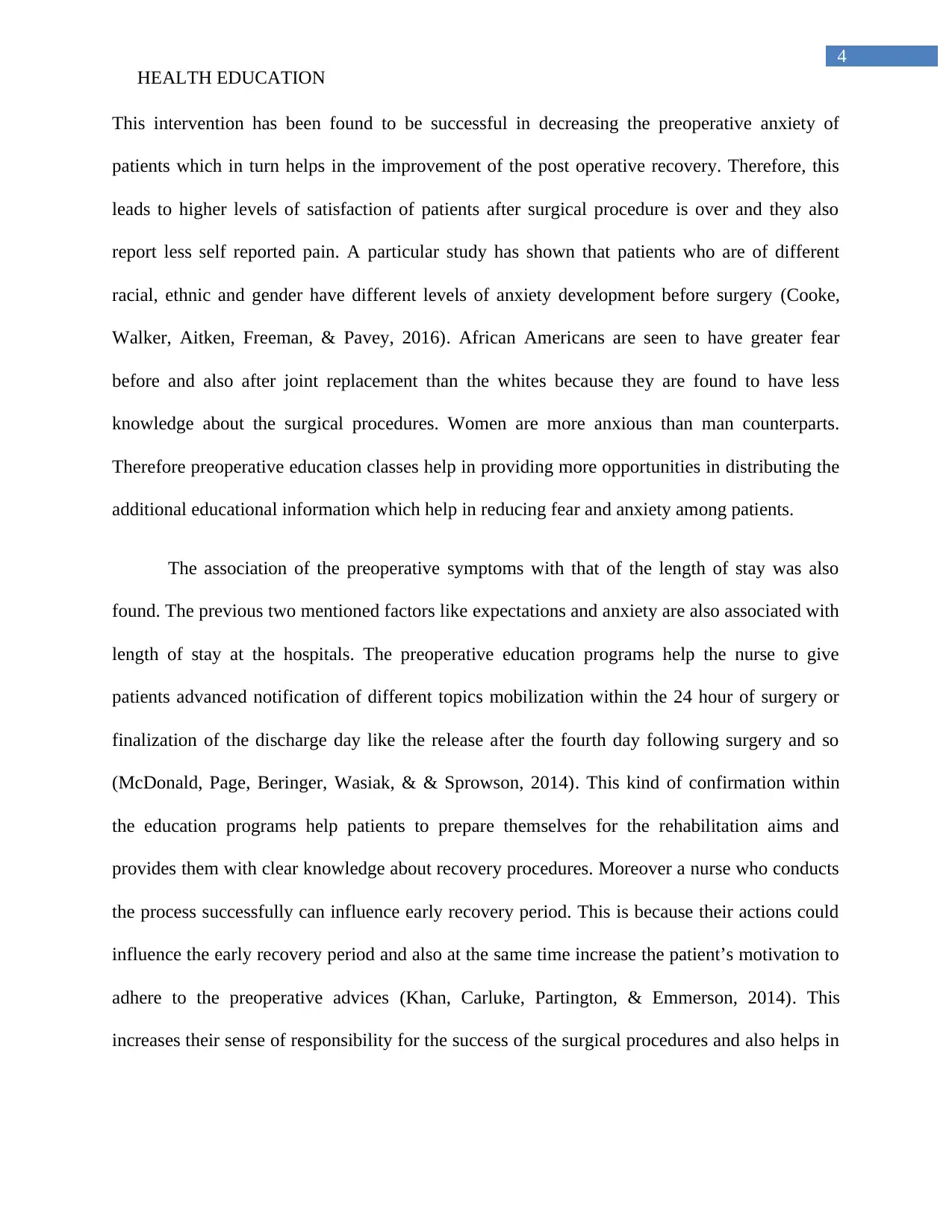
4
HEALTH EDUCATION
This intervention has been found to be successful in decreasing the preoperative anxiety of
patients which in turn helps in the improvement of the post operative recovery. Therefore, this
leads to higher levels of satisfaction of patients after surgical procedure is over and they also
report less self reported pain. A particular study has shown that patients who are of different
racial, ethnic and gender have different levels of anxiety development before surgery (Cooke,
Walker, Aitken, Freeman, & Pavey, 2016). African Americans are seen to have greater fear
before and also after joint replacement than the whites because they are found to have less
knowledge about the surgical procedures. Women are more anxious than man counterparts.
Therefore preoperative education classes help in providing more opportunities in distributing the
additional educational information which help in reducing fear and anxiety among patients.
The association of the preoperative symptoms with that of the length of stay was also
found. The previous two mentioned factors like expectations and anxiety are also associated with
length of stay at the hospitals. The preoperative education programs help the nurse to give
patients advanced notification of different topics mobilization within the 24 hour of surgery or
finalization of the discharge day like the release after the fourth day following surgery and so
(McDonald, Page, Beringer, Wasiak, & & Sprowson, 2014). This kind of confirmation within
the education programs help patients to prepare themselves for the rehabilitation aims and
provides them with clear knowledge about recovery procedures. Moreover a nurse who conducts
the process successfully can influence early recovery period. This is because their actions could
influence the early recovery period and also at the same time increase the patient’s motivation to
adhere to the preoperative advices (Khan, Carluke, Partington, & Emmerson, 2014). This
increases their sense of responsibility for the success of the surgical procedures and also helps in
HEALTH EDUCATION
This intervention has been found to be successful in decreasing the preoperative anxiety of
patients which in turn helps in the improvement of the post operative recovery. Therefore, this
leads to higher levels of satisfaction of patients after surgical procedure is over and they also
report less self reported pain. A particular study has shown that patients who are of different
racial, ethnic and gender have different levels of anxiety development before surgery (Cooke,
Walker, Aitken, Freeman, & Pavey, 2016). African Americans are seen to have greater fear
before and also after joint replacement than the whites because they are found to have less
knowledge about the surgical procedures. Women are more anxious than man counterparts.
Therefore preoperative education classes help in providing more opportunities in distributing the
additional educational information which help in reducing fear and anxiety among patients.
The association of the preoperative symptoms with that of the length of stay was also
found. The previous two mentioned factors like expectations and anxiety are also associated with
length of stay at the hospitals. The preoperative education programs help the nurse to give
patients advanced notification of different topics mobilization within the 24 hour of surgery or
finalization of the discharge day like the release after the fourth day following surgery and so
(McDonald, Page, Beringer, Wasiak, & & Sprowson, 2014). This kind of confirmation within
the education programs help patients to prepare themselves for the rehabilitation aims and
provides them with clear knowledge about recovery procedures. Moreover a nurse who conducts
the process successfully can influence early recovery period. This is because their actions could
influence the early recovery period and also at the same time increase the patient’s motivation to
adhere to the preoperative advices (Khan, Carluke, Partington, & Emmerson, 2014). This
increases their sense of responsibility for the success of the surgical procedures and also helps in
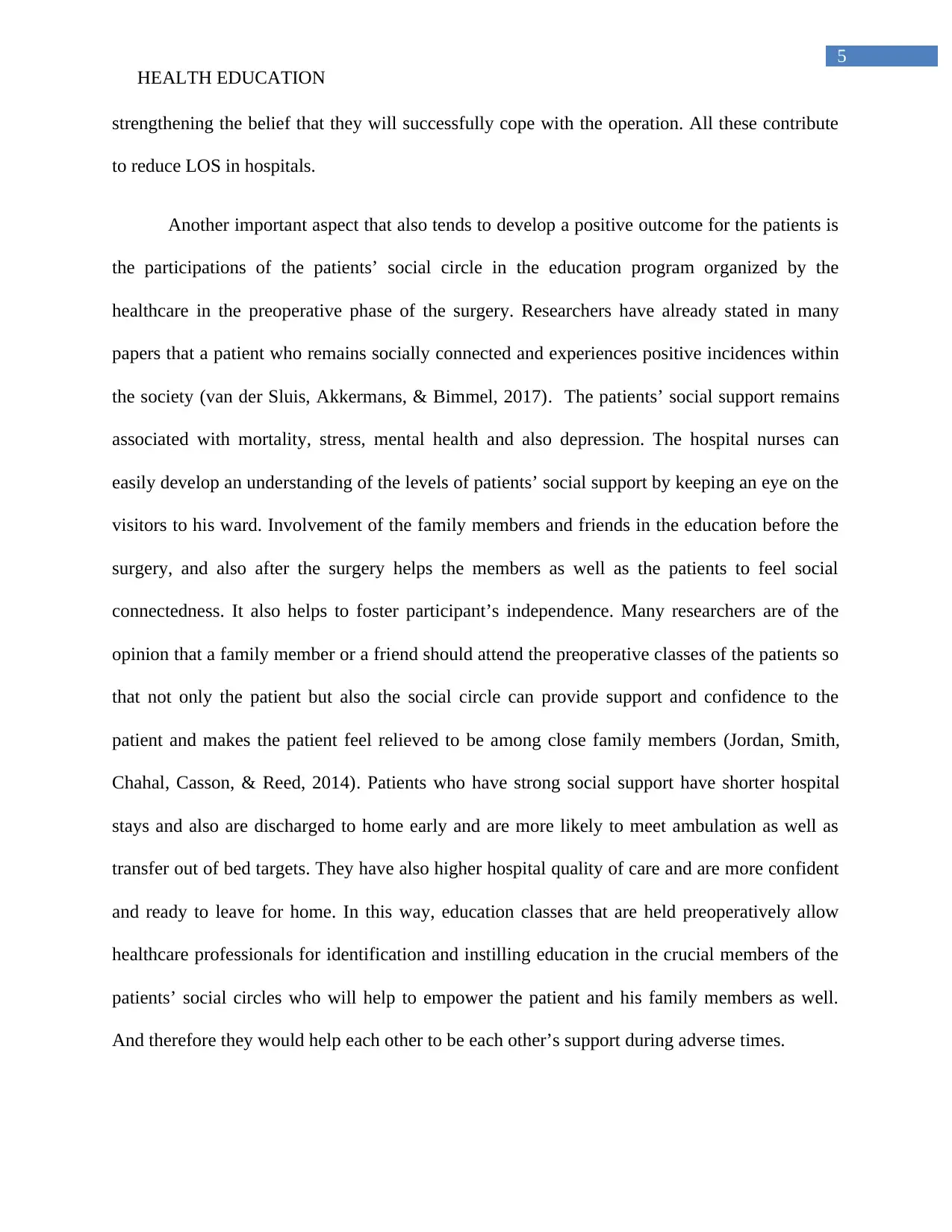
5
HEALTH EDUCATION
strengthening the belief that they will successfully cope with the operation. All these contribute
to reduce LOS in hospitals.
Another important aspect that also tends to develop a positive outcome for the patients is
the participations of the patients’ social circle in the education program organized by the
healthcare in the preoperative phase of the surgery. Researchers have already stated in many
papers that a patient who remains socially connected and experiences positive incidences within
the society (van der Sluis, Akkermans, & Bimmel, 2017). The patients’ social support remains
associated with mortality, stress, mental health and also depression. The hospital nurses can
easily develop an understanding of the levels of patients’ social support by keeping an eye on the
visitors to his ward. Involvement of the family members and friends in the education before the
surgery, and also after the surgery helps the members as well as the patients to feel social
connectedness. It also helps to foster participant’s independence. Many researchers are of the
opinion that a family member or a friend should attend the preoperative classes of the patients so
that not only the patient but also the social circle can provide support and confidence to the
patient and makes the patient feel relieved to be among close family members (Jordan, Smith,
Chahal, Casson, & Reed, 2014). Patients who have strong social support have shorter hospital
stays and also are discharged to home early and are more likely to meet ambulation as well as
transfer out of bed targets. They have also higher hospital quality of care and are more confident
and ready to leave for home. In this way, education classes that are held preoperatively allow
healthcare professionals for identification and instilling education in the crucial members of the
patients’ social circles who will help to empower the patient and his family members as well.
And therefore they would help each other to be each other’s support during adverse times.
HEALTH EDUCATION
strengthening the belief that they will successfully cope with the operation. All these contribute
to reduce LOS in hospitals.
Another important aspect that also tends to develop a positive outcome for the patients is
the participations of the patients’ social circle in the education program organized by the
healthcare in the preoperative phase of the surgery. Researchers have already stated in many
papers that a patient who remains socially connected and experiences positive incidences within
the society (van der Sluis, Akkermans, & Bimmel, 2017). The patients’ social support remains
associated with mortality, stress, mental health and also depression. The hospital nurses can
easily develop an understanding of the levels of patients’ social support by keeping an eye on the
visitors to his ward. Involvement of the family members and friends in the education before the
surgery, and also after the surgery helps the members as well as the patients to feel social
connectedness. It also helps to foster participant’s independence. Many researchers are of the
opinion that a family member or a friend should attend the preoperative classes of the patients so
that not only the patient but also the social circle can provide support and confidence to the
patient and makes the patient feel relieved to be among close family members (Jordan, Smith,
Chahal, Casson, & Reed, 2014). Patients who have strong social support have shorter hospital
stays and also are discharged to home early and are more likely to meet ambulation as well as
transfer out of bed targets. They have also higher hospital quality of care and are more confident
and ready to leave for home. In this way, education classes that are held preoperatively allow
healthcare professionals for identification and instilling education in the crucial members of the
patients’ social circles who will help to empower the patient and his family members as well.
And therefore they would help each other to be each other’s support during adverse times.
⊘ This is a preview!⊘
Do you want full access?
Subscribe today to unlock all pages.

Trusted by 1+ million students worldwide
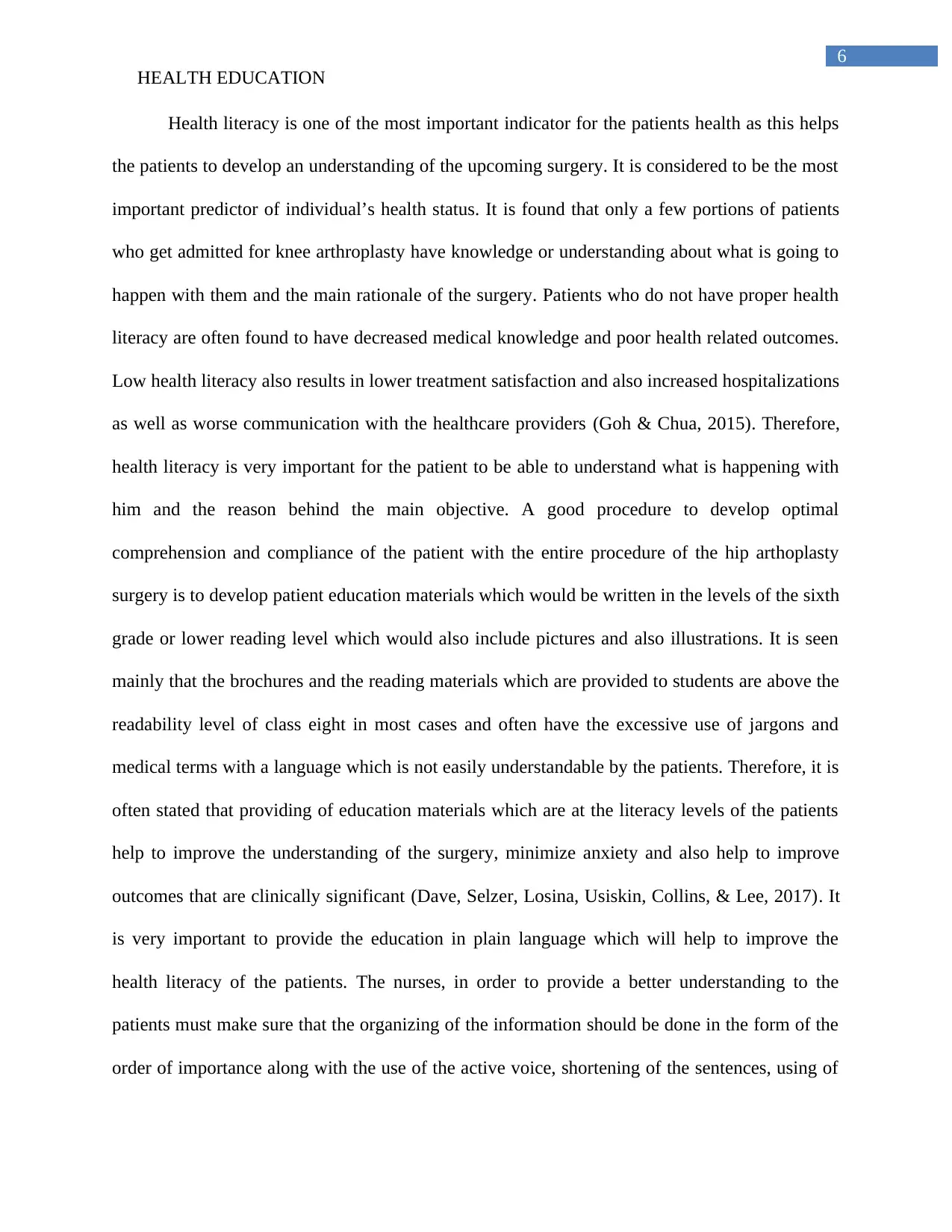
6
HEALTH EDUCATION
Health literacy is one of the most important indicator for the patients health as this helps
the patients to develop an understanding of the upcoming surgery. It is considered to be the most
important predictor of individual’s health status. It is found that only a few portions of patients
who get admitted for knee arthroplasty have knowledge or understanding about what is going to
happen with them and the main rationale of the surgery. Patients who do not have proper health
literacy are often found to have decreased medical knowledge and poor health related outcomes.
Low health literacy also results in lower treatment satisfaction and also increased hospitalizations
as well as worse communication with the healthcare providers (Goh & Chua, 2015). Therefore,
health literacy is very important for the patient to be able to understand what is happening with
him and the reason behind the main objective. A good procedure to develop optimal
comprehension and compliance of the patient with the entire procedure of the hip arthoplasty
surgery is to develop patient education materials which would be written in the levels of the sixth
grade or lower reading level which would also include pictures and also illustrations. It is seen
mainly that the brochures and the reading materials which are provided to students are above the
readability level of class eight in most cases and often have the excessive use of jargons and
medical terms with a language which is not easily understandable by the patients. Therefore, it is
often stated that providing of education materials which are at the literacy levels of the patients
help to improve the understanding of the surgery, minimize anxiety and also help to improve
outcomes that are clinically significant (Dave, Selzer, Losina, Usiskin, Collins, & Lee, 2017). It
is very important to provide the education in plain language which will help to improve the
health literacy of the patients. The nurses, in order to provide a better understanding to the
patients must make sure that the organizing of the information should be done in the form of the
order of importance along with the use of the active voice, shortening of the sentences, using of
HEALTH EDUCATION
Health literacy is one of the most important indicator for the patients health as this helps
the patients to develop an understanding of the upcoming surgery. It is considered to be the most
important predictor of individual’s health status. It is found that only a few portions of patients
who get admitted for knee arthroplasty have knowledge or understanding about what is going to
happen with them and the main rationale of the surgery. Patients who do not have proper health
literacy are often found to have decreased medical knowledge and poor health related outcomes.
Low health literacy also results in lower treatment satisfaction and also increased hospitalizations
as well as worse communication with the healthcare providers (Goh & Chua, 2015). Therefore,
health literacy is very important for the patient to be able to understand what is happening with
him and the reason behind the main objective. A good procedure to develop optimal
comprehension and compliance of the patient with the entire procedure of the hip arthoplasty
surgery is to develop patient education materials which would be written in the levels of the sixth
grade or lower reading level which would also include pictures and also illustrations. It is seen
mainly that the brochures and the reading materials which are provided to students are above the
readability level of class eight in most cases and often have the excessive use of jargons and
medical terms with a language which is not easily understandable by the patients. Therefore, it is
often stated that providing of education materials which are at the literacy levels of the patients
help to improve the understanding of the surgery, minimize anxiety and also help to improve
outcomes that are clinically significant (Dave, Selzer, Losina, Usiskin, Collins, & Lee, 2017). It
is very important to provide the education in plain language which will help to improve the
health literacy of the patients. The nurses, in order to provide a better understanding to the
patients must make sure that the organizing of the information should be done in the form of the
order of importance along with the use of the active voice, shortening of the sentences, using of
Paraphrase This Document
Need a fresh take? Get an instant paraphrase of this document with our AI Paraphraser
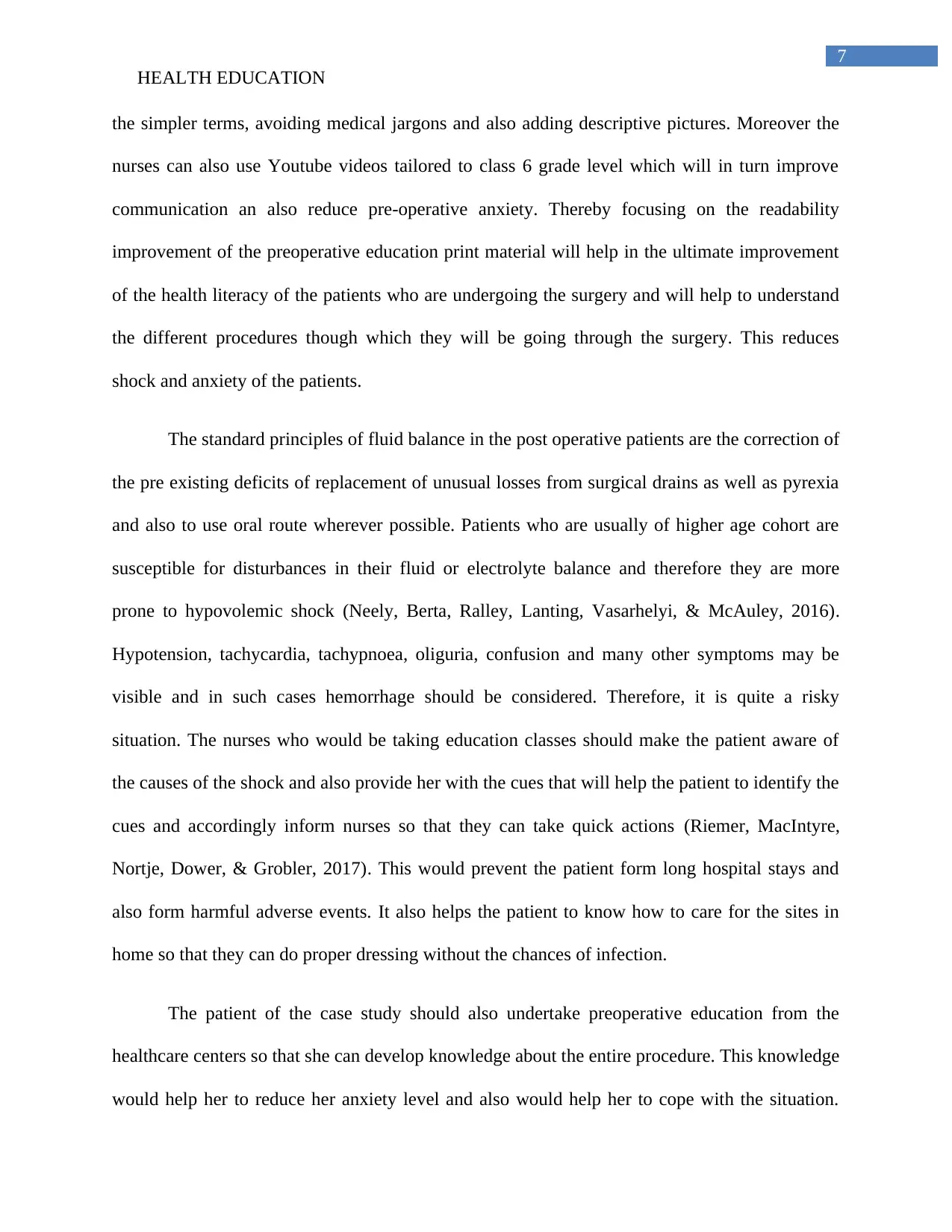
7
HEALTH EDUCATION
the simpler terms, avoiding medical jargons and also adding descriptive pictures. Moreover the
nurses can also use Youtube videos tailored to class 6 grade level which will in turn improve
communication an also reduce pre-operative anxiety. Thereby focusing on the readability
improvement of the preoperative education print material will help in the ultimate improvement
of the health literacy of the patients who are undergoing the surgery and will help to understand
the different procedures though which they will be going through the surgery. This reduces
shock and anxiety of the patients.
The standard principles of fluid balance in the post operative patients are the correction of
the pre existing deficits of replacement of unusual losses from surgical drains as well as pyrexia
and also to use oral route wherever possible. Patients who are usually of higher age cohort are
susceptible for disturbances in their fluid or electrolyte balance and therefore they are more
prone to hypovolemic shock (Neely, Berta, Ralley, Lanting, Vasarhelyi, & McAuley, 2016).
Hypotension, tachycardia, tachypnoea, oliguria, confusion and many other symptoms may be
visible and in such cases hemorrhage should be considered. Therefore, it is quite a risky
situation. The nurses who would be taking education classes should make the patient aware of
the causes of the shock and also provide her with the cues that will help the patient to identify the
cues and accordingly inform nurses so that they can take quick actions (Riemer, MacIntyre,
Nortje, Dower, & Grobler, 2017). This would prevent the patient form long hospital stays and
also form harmful adverse events. It also helps the patient to know how to care for the sites in
home so that they can do proper dressing without the chances of infection.
The patient of the case study should also undertake preoperative education from the
healthcare centers so that she can develop knowledge about the entire procedure. This knowledge
would help her to reduce her anxiety level and also would help her to cope with the situation.
HEALTH EDUCATION
the simpler terms, avoiding medical jargons and also adding descriptive pictures. Moreover the
nurses can also use Youtube videos tailored to class 6 grade level which will in turn improve
communication an also reduce pre-operative anxiety. Thereby focusing on the readability
improvement of the preoperative education print material will help in the ultimate improvement
of the health literacy of the patients who are undergoing the surgery and will help to understand
the different procedures though which they will be going through the surgery. This reduces
shock and anxiety of the patients.
The standard principles of fluid balance in the post operative patients are the correction of
the pre existing deficits of replacement of unusual losses from surgical drains as well as pyrexia
and also to use oral route wherever possible. Patients who are usually of higher age cohort are
susceptible for disturbances in their fluid or electrolyte balance and therefore they are more
prone to hypovolemic shock (Neely, Berta, Ralley, Lanting, Vasarhelyi, & McAuley, 2016).
Hypotension, tachycardia, tachypnoea, oliguria, confusion and many other symptoms may be
visible and in such cases hemorrhage should be considered. Therefore, it is quite a risky
situation. The nurses who would be taking education classes should make the patient aware of
the causes of the shock and also provide her with the cues that will help the patient to identify the
cues and accordingly inform nurses so that they can take quick actions (Riemer, MacIntyre,
Nortje, Dower, & Grobler, 2017). This would prevent the patient form long hospital stays and
also form harmful adverse events. It also helps the patient to know how to care for the sites in
home so that they can do proper dressing without the chances of infection.
The patient of the case study should also undertake preoperative education from the
healthcare centers so that she can develop knowledge about the entire procedure. This knowledge
would help her to reduce her anxiety level and also would help her to cope with the situation.
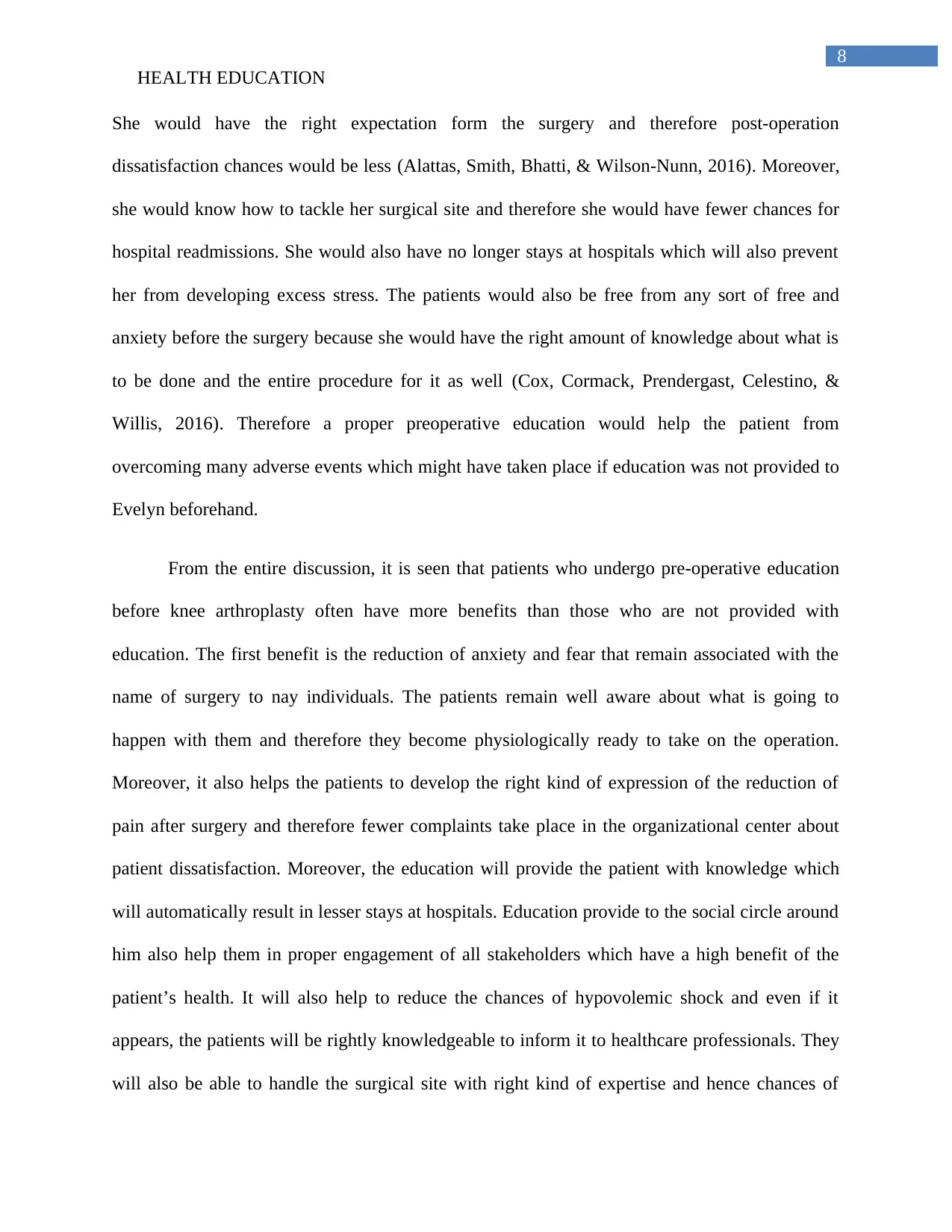
8
HEALTH EDUCATION
She would have the right expectation form the surgery and therefore post-operation
dissatisfaction chances would be less (Alattas, Smith, Bhatti, & Wilson-Nunn, 2016). Moreover,
she would know how to tackle her surgical site and therefore she would have fewer chances for
hospital readmissions. She would also have no longer stays at hospitals which will also prevent
her from developing excess stress. The patients would also be free from any sort of free and
anxiety before the surgery because she would have the right amount of knowledge about what is
to be done and the entire procedure for it as well (Cox, Cormack, Prendergast, Celestino, &
Willis, 2016). Therefore a proper preoperative education would help the patient from
overcoming many adverse events which might have taken place if education was not provided to
Evelyn beforehand.
From the entire discussion, it is seen that patients who undergo pre-operative education
before knee arthroplasty often have more benefits than those who are not provided with
education. The first benefit is the reduction of anxiety and fear that remain associated with the
name of surgery to nay individuals. The patients remain well aware about what is going to
happen with them and therefore they become physiologically ready to take on the operation.
Moreover, it also helps the patients to develop the right kind of expression of the reduction of
pain after surgery and therefore fewer complaints take place in the organizational center about
patient dissatisfaction. Moreover, the education will provide the patient with knowledge which
will automatically result in lesser stays at hospitals. Education provide to the social circle around
him also help them in proper engagement of all stakeholders which have a high benefit of the
patient’s health. It will also help to reduce the chances of hypovolemic shock and even if it
appears, the patients will be rightly knowledgeable to inform it to healthcare professionals. They
will also be able to handle the surgical site with right kind of expertise and hence chances of
HEALTH EDUCATION
She would have the right expectation form the surgery and therefore post-operation
dissatisfaction chances would be less (Alattas, Smith, Bhatti, & Wilson-Nunn, 2016). Moreover,
she would know how to tackle her surgical site and therefore she would have fewer chances for
hospital readmissions. She would also have no longer stays at hospitals which will also prevent
her from developing excess stress. The patients would also be free from any sort of free and
anxiety before the surgery because she would have the right amount of knowledge about what is
to be done and the entire procedure for it as well (Cox, Cormack, Prendergast, Celestino, &
Willis, 2016). Therefore a proper preoperative education would help the patient from
overcoming many adverse events which might have taken place if education was not provided to
Evelyn beforehand.
From the entire discussion, it is seen that patients who undergo pre-operative education
before knee arthroplasty often have more benefits than those who are not provided with
education. The first benefit is the reduction of anxiety and fear that remain associated with the
name of surgery to nay individuals. The patients remain well aware about what is going to
happen with them and therefore they become physiologically ready to take on the operation.
Moreover, it also helps the patients to develop the right kind of expression of the reduction of
pain after surgery and therefore fewer complaints take place in the organizational center about
patient dissatisfaction. Moreover, the education will provide the patient with knowledge which
will automatically result in lesser stays at hospitals. Education provide to the social circle around
him also help them in proper engagement of all stakeholders which have a high benefit of the
patient’s health. It will also help to reduce the chances of hypovolemic shock and even if it
appears, the patients will be rightly knowledgeable to inform it to healthcare professionals. They
will also be able to handle the surgical site with right kind of expertise and hence chances of
⊘ This is a preview!⊘
Do you want full access?
Subscribe today to unlock all pages.

Trusted by 1+ million students worldwide
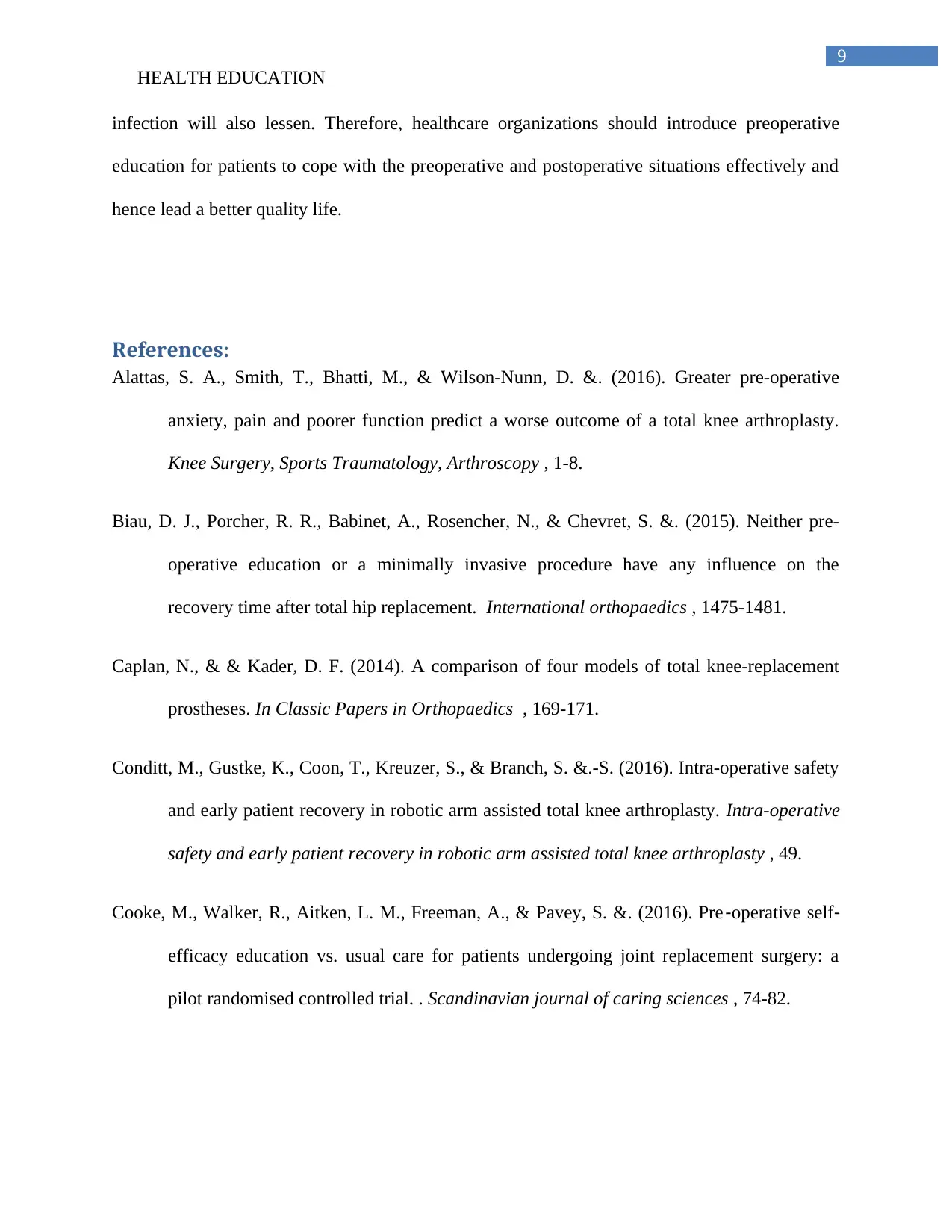
9
HEALTH EDUCATION
infection will also lessen. Therefore, healthcare organizations should introduce preoperative
education for patients to cope with the preoperative and postoperative situations effectively and
hence lead a better quality life.
References:
Alattas, S. A., Smith, T., Bhatti, M., & Wilson-Nunn, D. &. (2016). Greater pre-operative
anxiety, pain and poorer function predict a worse outcome of a total knee arthroplasty.
Knee Surgery, Sports Traumatology, Arthroscopy , 1-8.
Biau, D. J., Porcher, R. R., Babinet, A., Rosencher, N., & Chevret, S. &. (2015). Neither pre-
operative education or a minimally invasive procedure have any influence on the
recovery time after total hip replacement. International orthopaedics , 1475-1481.
Caplan, N., & & Kader, D. F. (2014). A comparison of four models of total knee-replacement
prostheses. In Classic Papers in Orthopaedics , 169-171.
Conditt, M., Gustke, K., Coon, T., Kreuzer, S., & Branch, S. &.-S. (2016). Intra-operative safety
and early patient recovery in robotic arm assisted total knee arthroplasty. Intra-operative
safety and early patient recovery in robotic arm assisted total knee arthroplasty , 49.
Cooke, M., Walker, R., Aitken, L. M., Freeman, A., & Pavey, S. &. (2016). Pre ‐operative self‐
efficacy education vs. usual care for patients undergoing joint replacement surgery: a
pilot randomised controlled trial. . Scandinavian journal of caring sciences , 74-82.
HEALTH EDUCATION
infection will also lessen. Therefore, healthcare organizations should introduce preoperative
education for patients to cope with the preoperative and postoperative situations effectively and
hence lead a better quality life.
References:
Alattas, S. A., Smith, T., Bhatti, M., & Wilson-Nunn, D. &. (2016). Greater pre-operative
anxiety, pain and poorer function predict a worse outcome of a total knee arthroplasty.
Knee Surgery, Sports Traumatology, Arthroscopy , 1-8.
Biau, D. J., Porcher, R. R., Babinet, A., Rosencher, N., & Chevret, S. &. (2015). Neither pre-
operative education or a minimally invasive procedure have any influence on the
recovery time after total hip replacement. International orthopaedics , 1475-1481.
Caplan, N., & & Kader, D. F. (2014). A comparison of four models of total knee-replacement
prostheses. In Classic Papers in Orthopaedics , 169-171.
Conditt, M., Gustke, K., Coon, T., Kreuzer, S., & Branch, S. &.-S. (2016). Intra-operative safety
and early patient recovery in robotic arm assisted total knee arthroplasty. Intra-operative
safety and early patient recovery in robotic arm assisted total knee arthroplasty , 49.
Cooke, M., Walker, R., Aitken, L. M., Freeman, A., & Pavey, S. &. (2016). Pre ‐operative self‐
efficacy education vs. usual care for patients undergoing joint replacement surgery: a
pilot randomised controlled trial. . Scandinavian journal of caring sciences , 74-82.
Paraphrase This Document
Need a fresh take? Get an instant paraphrase of this document with our AI Paraphraser
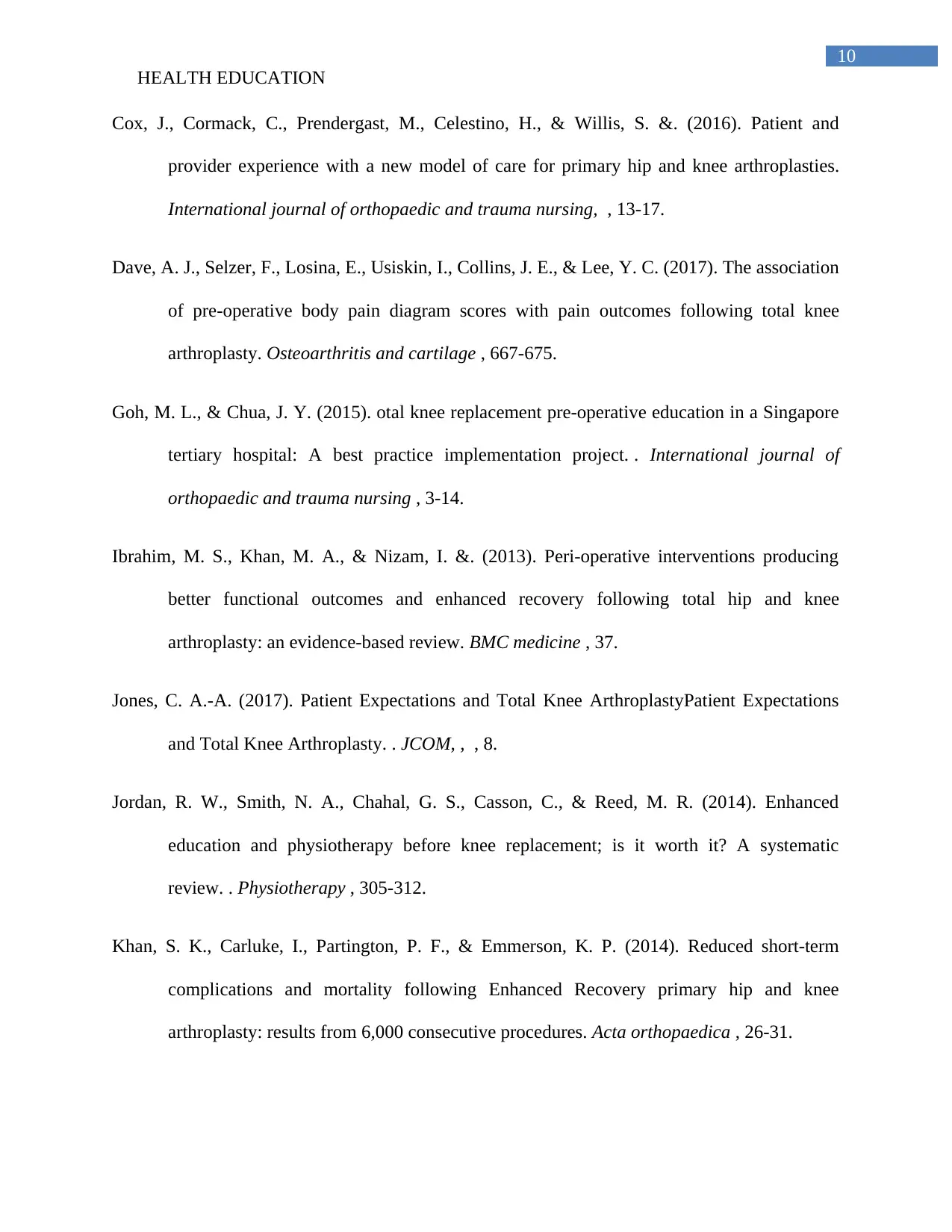
10
HEALTH EDUCATION
Cox, J., Cormack, C., Prendergast, M., Celestino, H., & Willis, S. &. (2016). Patient and
provider experience with a new model of care for primary hip and knee arthroplasties.
International journal of orthopaedic and trauma nursing, , 13-17.
Dave, A. J., Selzer, F., Losina, E., Usiskin, I., Collins, J. E., & Lee, Y. C. (2017). The association
of pre-operative body pain diagram scores with pain outcomes following total knee
arthroplasty. Osteoarthritis and cartilage , 667-675.
Goh, M. L., & Chua, J. Y. (2015). otal knee replacement pre-operative education in a Singapore
tertiary hospital: A best practice implementation project. . International journal of
orthopaedic and trauma nursing , 3-14.
Ibrahim, M. S., Khan, M. A., & Nizam, I. &. (2013). Peri-operative interventions producing
better functional outcomes and enhanced recovery following total hip and knee
arthroplasty: an evidence-based review. BMC medicine , 37.
Jones, C. A.-A. (2017). Patient Expectations and Total Knee ArthroplastyPatient Expectations
and Total Knee Arthroplasty. . JCOM, , , 8.
Jordan, R. W., Smith, N. A., Chahal, G. S., Casson, C., & Reed, M. R. (2014). Enhanced
education and physiotherapy before knee replacement; is it worth it? A systematic
review. . Physiotherapy , 305-312.
Khan, S. K., Carluke, I., Partington, P. F., & Emmerson, K. P. (2014). Reduced short-term
complications and mortality following Enhanced Recovery primary hip and knee
arthroplasty: results from 6,000 consecutive procedures. Acta orthopaedica , 26-31.
HEALTH EDUCATION
Cox, J., Cormack, C., Prendergast, M., Celestino, H., & Willis, S. &. (2016). Patient and
provider experience with a new model of care for primary hip and knee arthroplasties.
International journal of orthopaedic and trauma nursing, , 13-17.
Dave, A. J., Selzer, F., Losina, E., Usiskin, I., Collins, J. E., & Lee, Y. C. (2017). The association
of pre-operative body pain diagram scores with pain outcomes following total knee
arthroplasty. Osteoarthritis and cartilage , 667-675.
Goh, M. L., & Chua, J. Y. (2015). otal knee replacement pre-operative education in a Singapore
tertiary hospital: A best practice implementation project. . International journal of
orthopaedic and trauma nursing , 3-14.
Ibrahim, M. S., Khan, M. A., & Nizam, I. &. (2013). Peri-operative interventions producing
better functional outcomes and enhanced recovery following total hip and knee
arthroplasty: an evidence-based review. BMC medicine , 37.
Jones, C. A.-A. (2017). Patient Expectations and Total Knee ArthroplastyPatient Expectations
and Total Knee Arthroplasty. . JCOM, , , 8.
Jordan, R. W., Smith, N. A., Chahal, G. S., Casson, C., & Reed, M. R. (2014). Enhanced
education and physiotherapy before knee replacement; is it worth it? A systematic
review. . Physiotherapy , 305-312.
Khan, S. K., Carluke, I., Partington, P. F., & Emmerson, K. P. (2014). Reduced short-term
complications and mortality following Enhanced Recovery primary hip and knee
arthroplasty: results from 6,000 consecutive procedures. Acta orthopaedica , 26-31.
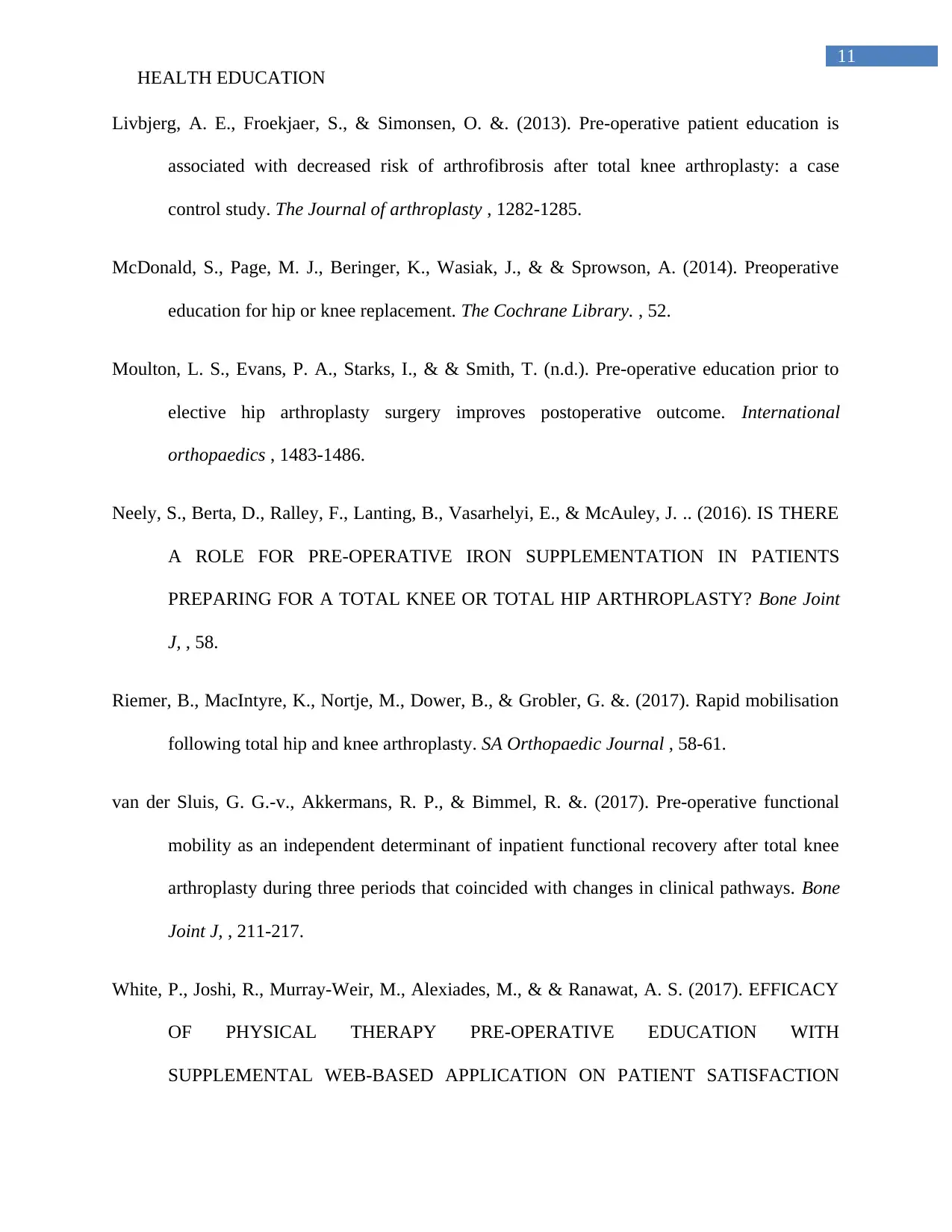
11
HEALTH EDUCATION
Livbjerg, A. E., Froekjaer, S., & Simonsen, O. &. (2013). Pre-operative patient education is
associated with decreased risk of arthrofibrosis after total knee arthroplasty: a case
control study. The Journal of arthroplasty , 1282-1285.
McDonald, S., Page, M. J., Beringer, K., Wasiak, J., & & Sprowson, A. (2014). Preoperative
education for hip or knee replacement. The Cochrane Library. , 52.
Moulton, L. S., Evans, P. A., Starks, I., & & Smith, T. (n.d.). Pre-operative education prior to
elective hip arthroplasty surgery improves postoperative outcome. International
orthopaedics , 1483-1486.
Neely, S., Berta, D., Ralley, F., Lanting, B., Vasarhelyi, E., & McAuley, J. .. (2016). IS THERE
A ROLE FOR PRE-OPERATIVE IRON SUPPLEMENTATION IN PATIENTS
PREPARING FOR A TOTAL KNEE OR TOTAL HIP ARTHROPLASTY? Bone Joint
J, , 58.
Riemer, B., MacIntyre, K., Nortje, M., Dower, B., & Grobler, G. &. (2017). Rapid mobilisation
following total hip and knee arthroplasty. SA Orthopaedic Journal , 58-61.
van der Sluis, G. G.-v., Akkermans, R. P., & Bimmel, R. &. (2017). Pre-operative functional
mobility as an independent determinant of inpatient functional recovery after total knee
arthroplasty during three periods that coincided with changes in clinical pathways. Bone
Joint J, , 211-217.
White, P., Joshi, R., Murray-Weir, M., Alexiades, M., & & Ranawat, A. S. (2017). EFFICACY
OF PHYSICAL THERAPY PRE-OPERATIVE EDUCATION WITH
SUPPLEMENTAL WEB-BASED APPLICATION ON PATIENT SATISFACTION
HEALTH EDUCATION
Livbjerg, A. E., Froekjaer, S., & Simonsen, O. &. (2013). Pre-operative patient education is
associated with decreased risk of arthrofibrosis after total knee arthroplasty: a case
control study. The Journal of arthroplasty , 1282-1285.
McDonald, S., Page, M. J., Beringer, K., Wasiak, J., & & Sprowson, A. (2014). Preoperative
education for hip or knee replacement. The Cochrane Library. , 52.
Moulton, L. S., Evans, P. A., Starks, I., & & Smith, T. (n.d.). Pre-operative education prior to
elective hip arthroplasty surgery improves postoperative outcome. International
orthopaedics , 1483-1486.
Neely, S., Berta, D., Ralley, F., Lanting, B., Vasarhelyi, E., & McAuley, J. .. (2016). IS THERE
A ROLE FOR PRE-OPERATIVE IRON SUPPLEMENTATION IN PATIENTS
PREPARING FOR A TOTAL KNEE OR TOTAL HIP ARTHROPLASTY? Bone Joint
J, , 58.
Riemer, B., MacIntyre, K., Nortje, M., Dower, B., & Grobler, G. &. (2017). Rapid mobilisation
following total hip and knee arthroplasty. SA Orthopaedic Journal , 58-61.
van der Sluis, G. G.-v., Akkermans, R. P., & Bimmel, R. &. (2017). Pre-operative functional
mobility as an independent determinant of inpatient functional recovery after total knee
arthroplasty during three periods that coincided with changes in clinical pathways. Bone
Joint J, , 211-217.
White, P., Joshi, R., Murray-Weir, M., Alexiades, M., & & Ranawat, A. S. (2017). EFFICACY
OF PHYSICAL THERAPY PRE-OPERATIVE EDUCATION WITH
SUPPLEMENTAL WEB-BASED APPLICATION ON PATIENT SATISFACTION
⊘ This is a preview!⊘
Do you want full access?
Subscribe today to unlock all pages.

Trusted by 1+ million students worldwide
1 out of 12
Related Documents
Your All-in-One AI-Powered Toolkit for Academic Success.
+13062052269
info@desklib.com
Available 24*7 on WhatsApp / Email
![[object Object]](/_next/static/media/star-bottom.7253800d.svg)
Unlock your academic potential
Copyright © 2020–2026 A2Z Services. All Rights Reserved. Developed and managed by ZUCOL.





